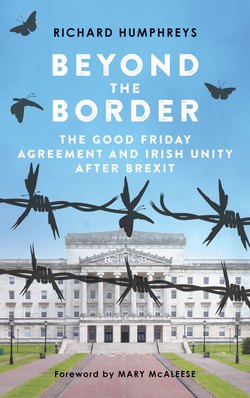Читать книгу Beyond the Border - Richard Humphreys - Страница 9
На сайте Литреса книга снята с продажи.
ОглавлениеForeword
The Good Friday Agreement of 1998 was a watershed moment in Irish and British history. Overwhelmingly supported by the electorate of Northern Ireland and Ireland, the Agreement created an interlocking set of principles and structures designed to develop a peaceful partnership between the different traditions and conflicting political ambitions robust enough to consign conflict to history. A new future beckoned based on parity of esteem, equality, mutual respect, shared government in Northern Ireland and intergovernmental collaboration on the North–South and East–West axes. Over its twenty years of operation, the Agreement has proved to be encouragingly resilient in the face of many difficulties but there can be little doubt that it now faces a particularly testing period with the collapse of the devolved government in Northern Ireland and the United Kingdom’s withdrawal from the European Union. These very issues lend an urgency to refocusing attention on the structure and principles which underpin the Agreement and on the imperative this generation has and owes to past and future generations to ensure it continues to be the lodestar which guides us steadily on the path to peace and reconciliation. The institutions created by it are intended to withstand and provide a safe space for ongoing debate and deliberation on the constitutional choices available to the people of Northern Ireland. They also form the template as much for the shape of Northern Ireland’s political structures within the United Kingdom as within a united Ireland as Mr Justice Richard Humphreys’ timely and useful book asserts. He argues that a devolved assembly where the various traditions must work together is, under the Agreement, a permanent feature of the landscape, that the validity, equality and mutual respect of the different traditions are enduring commitments, regardless of whether the constitutional situation remains as it is or changes. This raises uncomfortable questions.
Mr Justice Humphreys pursues a number of issues which have been overlooked up to now given this reality and which commend themselves to further investigation by the relevant governments, political parties and the constituencies which make up the public in Ireland and the United Kingdom, jurisdictions whose collegial relationship has been transformed in recent years. This is an area often fraught with fears, and suspicions, but the author is to be commended for exploring these sensitive issues without engaging in political comment or favouring any particular shade of political opinion. His focus is on the Agreement: what it means and what the practical implications are of the spirit and letter of the principles contained in it. It is clear that some aspects of the Agreement have not been understood and assimilated, and, insofar as he seeks to address some of these misconceptions, in a non-political and non-partisan spirit, I believe this is a necessary corrective to the debate. He also highlights how a renewed focus on what is required by the Agreement can provide new perspectives with which to make devolution work. While setting out what the Agreement means, and outlining options for progress within those parameters, he wisely leaves all consequent decisions to the political process. To that extent, it is a book which strives for scrupulous fairness and impartiality in what is usually a hotly contested political space where resentment gets in the way of the calm reasoning that this debate would benefit greatly from.
Mr Justice Humphreys, in this thoughtful and excellent work, carefully lays out the sometimes uncomfortable implications of accommodating all traditions. His is a vision for Northern Ireland as a place at peace, where North/South relationships develop unforced and organically over time as has been happening naturally and imperceptibly since 1998 but with manifest, tangible benefits for all. In his view, constitutional change, if it were to happen, would evolve in the context of progressing partnership rather than sudden political rupture. The old language of winners and losers is redundant in such a vision. It is about choosing the best future for all of us in an egalitarian culture of good neighbours and not simply a flag.
Dr Mary McAleese
8th President of Ireland, 1997–2011
April 2018
